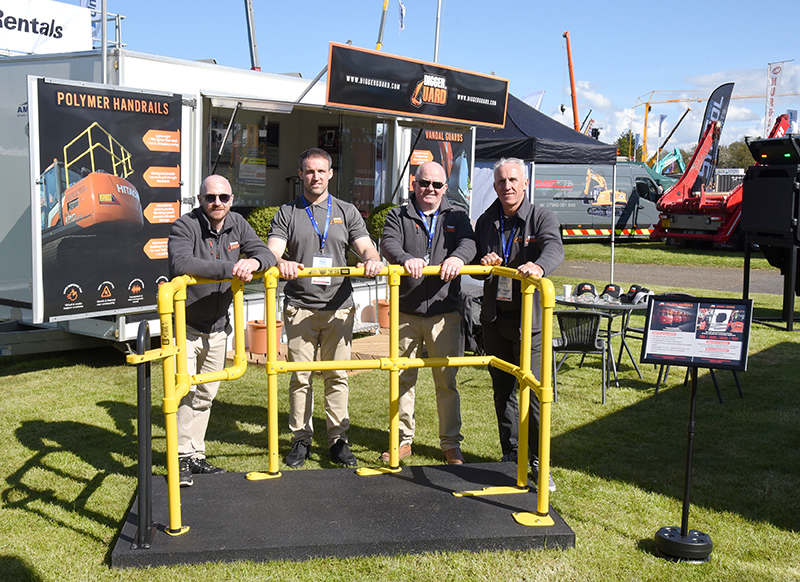
SECURITY and safety solutions specialist DIGGER GUARD has revealed the benefits of showcasing its award-winning innovations to the plant industry in-person, following a successful ScotPlant debut.
The manufacturer, which has premises in Glasgow and Newcastle, had a range of products on display at the Royal Highland Centre, including its polymer handrail ‘boxing ring’ systems, described as being 75% lighter than steel.
“When guys who have used steel rails all their life (find out) you’ve got a polymer version, they might question it,” DIGGER GUARD’s Adam Smith explained. “But people have come along and been able to shake it, lean against it, and see the strength actually is there.”
Explaining that the solution was created to counter the issue of vibration causing shearing of traditional steel rails and damage to welds, Adam told how the patent-pending system is vibration fatigue-resistant whilst also passing the relevant strength tests.
“On top of that, it’s also good if you’re using 3D guidance systems,” he added. “There’s no interference with the signals, whereas with a metal rail you can imagine it gets in the way of the signal. With metal rails you also have the inconvenience of rust and repainting. With our polymer alternative, this isn’t an issue.”
Last year, DIGGER GUARD’s Vandal Guard solution won Best Security Initiative at the Plantworx Innovation Awards. The hang and lock system fully encases cabs without the need to drill into the machine and the patented design also doubles up as a secure, rainproof, roof box for storage when not in use.
The team uses special 3D scanning technology to accurately and quickly create a guard that fits each individual machine, with the firm adding that the initial fit takes under 45 minutes, and under 5 minutes on or off after that.
Debuting the solution’s new lighting system at ScotPlant, Adam explained that previously there were beacons on top of the roof box, which added extra height to the digger. The optional lighting system is integrated within the Vandal Guard box, allowing for a more streamlined design.
“The front panel becomes the lid of the roof box, so that keeps all your panels sealed when you’re using the machine,” Adam explained. “We used to use a cage, so you’d put the panels in the cage, but what we found is there was a lot of noise pollution with that rattling on the roof; you don’t get that with this box.”
Switching from a metal cage to an enclosed system also solves the problems of water ingress and corrosion. Adam stated the business had ‘a lot of good interest’ in its offering at ScotPlant. “It’s great being here and finding some of the companies we can deal with more locally (to our Glasgow office). It’s been an important move.”



